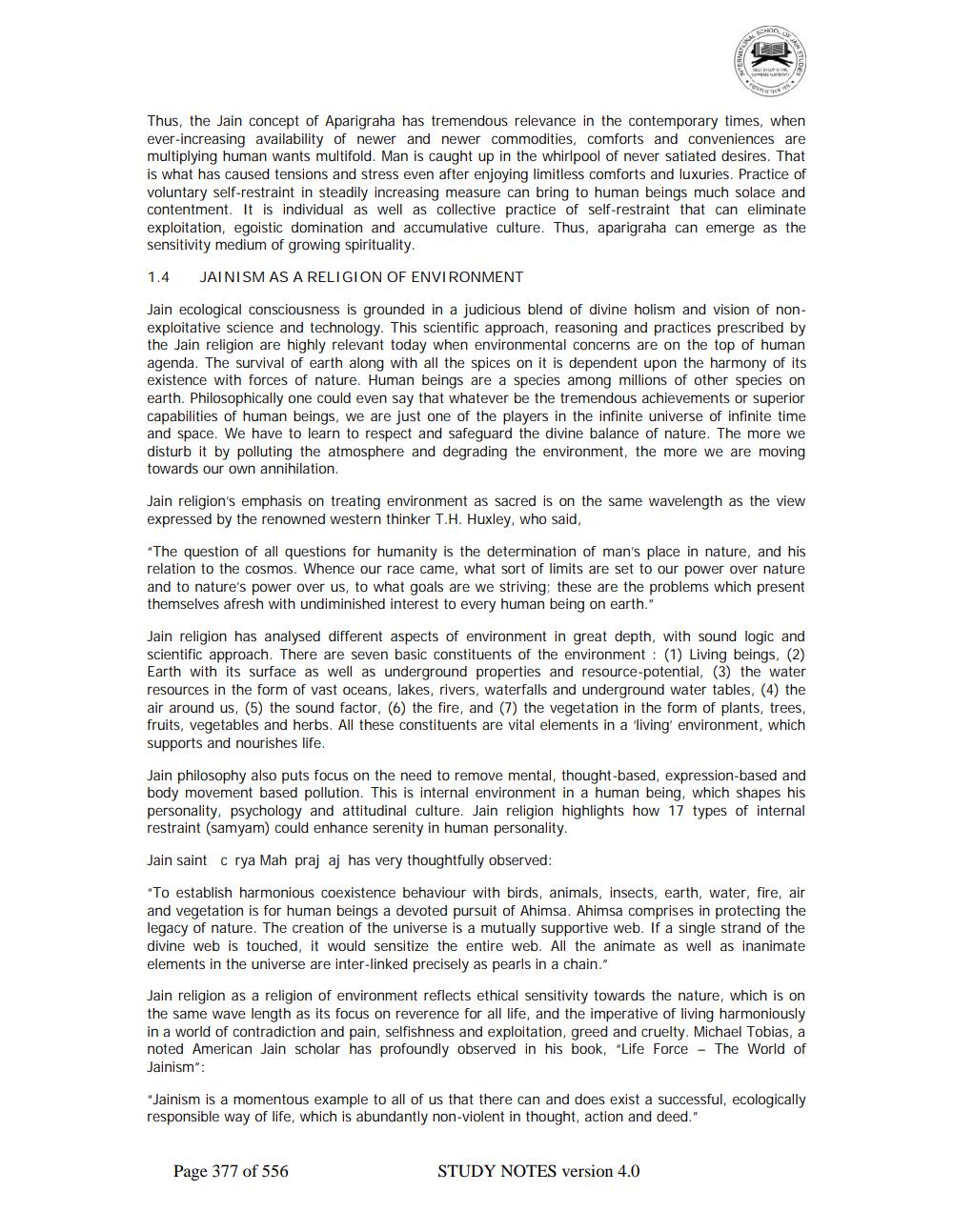________________
Thus, the Jain concept of Aparigraha has tremendous relevance in the contemporary times, when ever-increasing availability of newer and newer commodities, comforts and conveniences are multiplying human wants multifold. Man is caught up in the whirlpool of never satiated desires. That is what has caused tensions and stress even after enjoying limitless comforts and luxuries. Practice of voluntary self-restraint in steadily increasing measure can bring to human beings much solace and contentment. It is individual as well as collective practice of self-restraint that can eliminate exploitation, egoistic domination and accumulative culture. Thus, aparigraha can emerge as the sensitivity medium of growing spirituality.
JAINISM AS A RELIGION OF ENVIRONMENT
1.4
Jain ecological consciousness is grounded in a judicious blend of divine holism and vision of nonexploitative science and technology. This scientific approach, reasoning and practices prescribed by the Jain religion are highly relevant today when environmental concerns are on the top of human agenda. The survival of earth along with all the spices on it is dependent upon the harmony of its existence with forces of nature. Human beings are a species among millions of other species on earth. Philosophically one could even say that whatever be the tremendous achievements or superior capabilities of human beings, we are just one of the players in the infinite universe of infinite time and space. We have to learn to respect and safeguard the divine balance of nature. The more we disturb it by polluting the atmosphere and degrading the environment, the more we are moving towards our own annihilation.
Jain religion's emphasis on treating environment as sacred is on the same wavelength as the view expressed by the renowned western thinker T.H. Huxley, who said,
"The question of all questions for humanity is the determination of man's place in nature, and his relation to the cosmos. Whence our race came, what sort of limits are set to our power over nature and to nature's power over us, to what goals are we striving; these are the problems which present themselves afresh with undiminished interest to every human being on earth."
Jain religion has analysed different aspects of environment in great depth, with sound logic and scientific approach. There are seven basic constituents of the environment (1) Living beings, (2) Earth with its surface as well as underground properties and resource-potential, (3) the water resources in the form of vast oceans, lakes, rivers, waterfalls and underground water tables, (4) the air around us, (5) the sound factor, (6) the fire, and (7) the vegetation in the form of plants, trees, fruits, vegetables and herbs. All these constituents are vital elements in a 'living' environment, which supports and nourishes life.
Jain philosophy also puts focus on the need to remove mental, thought-based, expression-based and body movement based pollution. This is internal environment in a human being, which shapes his personality, psychology and attitudinal culture. Jain religion highlights how 17 types of internal restraint (samyam) could enhance serenity in human personality.
Jain saint c rya Mah praj aj has very thoughtfully observed:
"To establish harmonious coexistence behaviour with birds, animals, insects, earth, water, fire, air and vegetation is for human beings a devoted pursuit of Ahimsa. Ahimsa comprises in protecting the legacy of nature. The creation of the universe is a mutually supportive web. If a single strand of the divine web is touched, it would sensitize the entire web. All the animate as well as inanimate elements in the universe are inter-linked precisely as pearls in a chain."
Jain religion as a religion of environment reflects ethical sensitivity towards the nature, which is on the same wave length as its focus on reverence for all life, and the imperative of living harmoniously in a world of contradiction and pain, selfishness and exploitation, greed and cruelty. Michael Tobias, a noted American Jain scholar has profoundly observed in his book, "Life Force - The World of Jainism":
"Jainism is a momentous example to all of us that there can and does exist a successful, ecologically responsible way of life, which is abundantly non-violent in thought, action and deed."
Page 377 of 556
STUDY NOTES version 4.0




